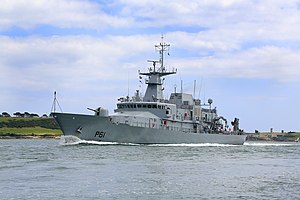Samuel Beckett-class OPV

Samuel Beckett shortly after commissioning
|
|
| Class overview | |
|---|---|
| Name: | Samuel Beckett class |
| Builders: | Babcock Marine |
| Operators: |
|
| Preceded by: | Róisín class |
| Cost: | €108 million (first two), €54.3 million (fourth ship) |
| In commission: | As of July 2016 |
| Building: | 1 |
| Planned: | 4 |
| Completed: | 3 |
| Active: | 3 |
| General characteristics | |
| Type: | Offshore patrol vessel |
| Displacement: | 2,256 tonnes |
| Length: | 90 m (300 ft) |
| Beam: | 14 m (46 ft) |
| Draught: | 3.8 m (12 ft) |
| Propulsion: |
Two Wärtsilä medium speed diesel engines (5,440 kW (7,300 hp) each) 450 kW bow thruster |
| Speed: |
|
| Range: | 6,000 nautical miles (11,000 km; 6,900 mi) at 15 knots (28 km/h; 17 mph) |
| Endurance: | 21 days |
| Boats & landing craft carried: |
3 x 8 m (26 ft) RHIB |
| Capacity: | 3 x 6.1 m (20 ft) sea container, 1 x 5 ton, 9.56 m (31.4 ft) crane aft |
| Complement: | 44 + up to 10 trainees |
| Sensors and processing systems: |
Fire control: Electro Optical |
| Armament: |
|
| Aviation facilities: | UAV only |
Two Wärtsilä medium speed diesel engines (5,440 kW (7,300 hp) each)
The Samuel Beckett-class offshore patrol vessel is a class of offshore patrol vessels (OPV) ordered by the Irish Naval Service from October 2010. The first vessel is named Samuel Beckett, which is also the name given to the class. Construction on this first vessel commenced in November 2011, and it was commissioned in May 2014. The second vessel, LÉ James Joyce, was delivered in 2015 and the third, LÉ William Butler Yeats, was delivered in 2016.
Vard Marine Inc. (formerly STX Marine) designed the vessels, which have features in common with an earlier design, the Róisín class, in service with the Irish Naval Service since 1999.
The 90-metre (300 ft) OPV vessels are designated PV90 by Babcock Marine and approximately 10 metres (33 ft) longer with an additional 0.6 metres (2 ft 0 in) in depth to the existing Róisín-class PV80 vessels. This was intended to increase both its capabilities and abilities in the rough waters of the North Atlantic. The PV90 ship is designed carry a crew of 44 and have space for up to 10 trainees. The ships' published cruising speed is 16 knots (30 km/h; 18 mph), with a top speed of 23 knots (43 km/h; 26 mph).
The New Zealand Navy uses an 85-metre (279 ft) version of the Vard Marine Inc. OPV design, referred to as the Protector-class offshore patrol vessel. This is a modified version of the older Irish Naval Service Róisín-class PV80 vessels - with helideck and hangar incorporated.
The Samuel Beckett-class ships are designed to carry remotely operated submersibles and a decompression chamber for divers. This is intended to add enhanced capabilities to undertake search and rescue, search and recovery, under-sea exploration and increased sea area surveillance. The expanded deck area would also allow the Naval Service to potentially deploy unmanned aerial vehicles for the first time. Features also include Dynamic Positioning systems and "Power Take In Systems" to enable fuel savings, as the main engines can be shut-down and power sourced from battery storage or a smaller more economical engine.
...
Wikipedia
